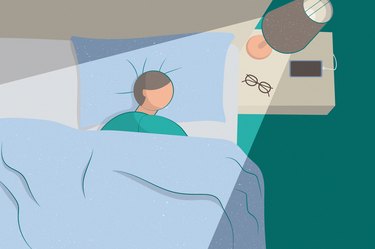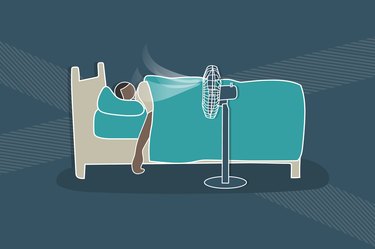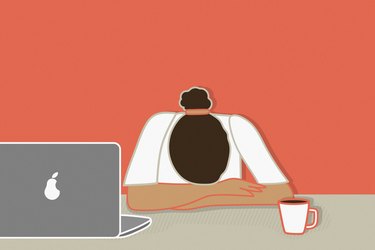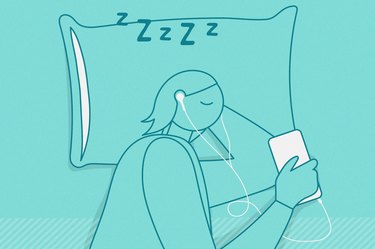
Whether you're just so tuckered out from the day or it's a long-standing habit, sometimes you just fall asleep with the light on. You might wake up later and turn it off or roll over and leave it on, but the question remains: Is it bad to sleep with lights on?
If you've ever done this — or it's part of your nighttime routine — here's what you need to know about how light affects you while you snooze.
Video of the Day
Video of the Day
Side Effects of Sleeping With Lights On
Ideally, you'd hit the lights before you hit the sheets.
"Sleeping in a dark room is generally better for your sleep and health," Shelby Harris, PsyD, director of Sleep Health at Sleepopolis, tells LIVESTRONG.com. "Light exposure, especially at night, can disrupt your sleep cycle and make it harder to fall asleep. Sleeping with lights on can affect the quality and duration of your sleep."
Here, we'll explore each one more in depth:
1. Makes It Harder to Fall Asleep
Light is a strong signal to your brain: It's time to be awake! On the other hand, dark tells your brain to power down because it's time to sleep, notes The National Institute for Occupational Safety and Health (NIOSH).
That's because light suppresses the secretion of melatonin, a hormone your brain pumps out when it's dark, per the National Center for Complementary and Integrative Health, which helps you sleep and regulates your sleep-wake cycle, also known as your body's internal clock.
In addition, Harris says, light is stimulating to your brain, so it's more difficult to wind down before bed.
"Having the lights on can make it difficult to feel sleepy and fall asleep," says Harris.
Past research in The Journal of Clinical Endocrinology & Metabolism found that, in people exposed to room light during the eight hours before bed, melatonin production was lower and its release was delayed compared to those who were exposed to dim light.
2. Disrupts Your Sleep Cycle
Room light can be a disruption to the different stages of sleep, all of which are important for waking up well-rested and getting what your body needs out of sleep.
Earlier research in Sleep Medicine found that sleeping with a bedside light on messed with sleep cycles, increasing stage 1 sleep (the initial short, light stage of sleep) and decreasing slow-wave sleep (deep sleep).
Arousals from sleep also increased when the lights were on. Why? Lights affect brain activity, even while you snooze.
Additional research in Chronobiology International in 2019 found that even low levels of light while your eyes are closed affects your circadian rhythm.
3. Decreases the Quality and Length of Sleep
If you have your eyes closed, then what's the big deal? Even so, "light in the room can still affect your sleep," says Harris.
Sleeping in an area with greater outdoor nighttime light exposure is associated with a decrease in sleep time, suggests June 2016 research in Sleep.
Why? It's all about the melatonin suppression, the authors say.
4. Makes You Feel Bad the Next Day
If you're not getting enough sleep and/or your snooze time is poor quality, then it's not likely you'll wake up feeling refreshed.
"Sleeping with the lights on can make you feel tired and groggy the next day," says Harris. "It can affect your concentration, mood and overall health."
5. May Affect Your Risk for Chronic Disease
Lack of sleep has been linked to the development of diabetes, cardiovascular disease, obesity and depression, per the Centers for Disease Control and Prevention (CDC). And it just so happens that lights-on sleeping will do you no favors.
In a small, 20-person study in PNAS in March 2022, healthy adults who slept with moderate light exposure during sleep for one night had a higher nighttime heart rate, decreased heart rate variability (one marker of heart health) and higher insulin resistance the next morning compared to those who slept in dim light.
Longer-term research is needed, but the researchers say that sleeping in a darker environment may benefit cardiovascular and metabolic health.
Alternatives to Sleeping With Lights On
If you sleep with the lights on, no shame! You have legit reasons to do so. Harris explains that people do it for all sorts of reasons, like for comfort if you feel anxious in the dark, safety concerns or personal or partner preferences.
Understanding why you're doing it will help you determine other alternatives to try to transition to a darker nighttime environment.
"It's about finding a balance between having enough light for safety and keeping the sleep environment conducive to good sleep," Harris says.
Here are some of her suggestions:
- Use a dim night light.
- Set up motion-activated lights. (Some of these are available as night lights.)
- Keep a flashlight by your bed. (Use it to guide you to the bathroom, if needed.)
- Turn on the flashlight function on your smartphone. (Just don't get caught up in checking your email at 2 a.m.!)
Other Healthy Sleep Tips
One in three adults don't get enough sleep, according to the CDC. Here's how to create a sleep-supportive environment:
1. Set a Schedule
Wake up and go to bed at the same time every day, says Harris. This sets your body clock, and having an established routine will help you stick to it.
2. Create a Comfortable Place to Sleep
Your bedroom should be cool, dark and quiet, says Harris. Even street lights and other outdoor ambient light coming in may have the potential disrupt melatonin production, suggests November 2019 research in Sustainability.
If outside light is a disruptor, hang blackout curtains, if possible, or try wearing a sleep mask.
3. Make a Bedtime Routine
Bedtime routines are not just for kids — they benefit adults, too.
Do whatever you feel is relaxing, whether that's some light stretching, journaling, reading or taking a warm bath or shower.
This "signals your body that it's time to wind down," says Harris.
4. Plan a De-stressing Strategy
When stress builds up during the day, it can be tough to shut it off prior to bed. The result? You lie down only to have your mind run a mile a minute.
Identify go-to relaxation techniques that speak to you. Finding a type of deep breathing you love, venting to a friend, talking to a therapist, exercise or trying a meditation app are just a few examples, but only you know what hits your simmer-down switch.
So, How Bad Is It Really to Sleep With Lights On?
Sleeping with a light on can make it more difficult to go to sleep, can affect your circadian rhythm and may impair your sleep quality or duration.
If possible, prioritize a dark sleeping environment at night.
"To sleep better, it's important to make the room dark by using curtains, blinds or an eye mask," Harris says.
- The National Institute for Occupational Safety and Health: "Effects of Light on Circadian Rhythms."
- National Center for Complementary and Integrative Health: "Melatonin: What You Need To Know."
- The Journal of Clinical Endocrinology & Metabolism: "Exposure to Room Light before Bedtime Suppresses Melatonin Onset and Shortens Melatonin Duration in Humans."
- Sustainability: "Light Pollution, Circadian Photoreception, and Melatonin in Vertebrates."
- Centers for Disease Control and Prevention: "Sleep and Chronic Disease."
- Sleep Medicine: "Let there be no light: the effect of bedside light on sleep quality and background electroencephalographic rhythms."
- Sleep: "Artificial Outdoor Nighttime Lights Associate with Altered Sleep Behavior in the American General Population."
- Chronobiology International: "Systematic review of light exposure impact on human circadian rhythm."
- Centers for Disease Control and Prevention: "1 in 3 adults don’t get enough sleep."
Is this an emergency? If you are experiencing serious medical symptoms, please see the National Library of Medicine’s list of signs you need emergency medical attention or call 911.



